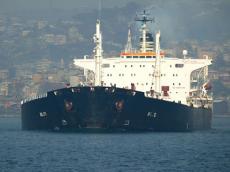|
|
TODAY.AZ / World news
New oil tankers expand Iran's export capacity
06 February 2013 [12:11] - TODAY.AZ
 Iran has taken delivery of several new tankers from Chinese shipyards, giving it greater flexibility in maintaining oil exports in the face of Western sanctions, Reuters reported.
Iran has taken delivery of several new tankers from Chinese shipyards, giving it greater flexibility in maintaining oil exports in the face of Western sanctions, Reuters reported.The sanctions, imposed by the United States and European Union to halt a nuclear programme they believe is a cover to develop atomic weapons, have hurt Iran's oil exports, leading to a plunge in its currency.
But Iranian crude oil imports rose in December to their highest since European Union sanctions took effect last July, helped in part by more tankers deployed.
Since the start of 2013, two supertankers have joined Iran's trading fleet, with another three new vessels having arrived in recent months, according to industry sources and shipping data. Each vessel has a maximum capacity of 2 million barrels of oil.
Iran's main tanker operator NITC has been blacklisted by the West, and the EU has imposed an outright ban on ship insurance provision.
The exit from Iran of top providers of ship certification, vital for ports access, and the de-flagging from international registries of vessels have added to operational challenges for Iranian shipping firms including NITC.
"Iran is having to stay ahead of sanctions and needs to make sure they can keep their fleet on the water, which includes changing the flags of their ships and finding certification for their vessels," a shipping industry source said.
With the latest acquisitions, NITC's supertanker fleet has been boosted to 30 vessels with a maximum carrying capacity of 60 million barrels. It has an additional 14 small crude oil tankers.
NITC officials could not immediately be reached for comment.
The Atlantis and Infinity, the two vessels that joined NITC's fleet in recent weeks, are part of a $1.2 billion contract with two Chinese shipyards that was ordered in 2009 for 12 new supertankers. The Carnation, Rainbow and Skyline reached NITC last year.
Last year sources in China had said the yards had planned to deliver the 12 by the end of 2013 to NITC.
An industry official in China familiar with the matter said he was aware of "several new tankers delivered from China's shipyards over the past one or two months".
"All we heard is new tankers being delivered, and that is good news for us," the official said.
Iran also took delivery of a liquefied petroleum gas tanker in January, vessels that can carry propane and butane, data showed.
To get round insurance restrictions, NITC tankers have been relying on cover from Iranian providers, though industry sources said it remained unclear what type of classification provision the vessels had.
While many of Iran's clients have slashed purchases of oil, the lifeblood of Tehran's economy, China has maintained robust demand.
IHS Fairplay data showed the remaining six of the seven tankers on order, which include Sonata and Demos, were at various stages of development in China. Work was yet to start on the seventh tanker Dusk.
Western sanctions halved Iran's oil exports in 2012 from 2.2 million barrels per day (bpd) in late 2011, leading to billions of dollars in lost revenue.
While exports rose to 1.4 million bpd in December 2012, sales were expected to dip in January ahead of new U.S. sanctions, industry sources told Reuters last week.
Iran and world powers announced new talks on Tehran's nuclear programme on Feb. 26, but hopes of progress after Tuesday's announcement were tempered when an Iranian official said the West's goal in talking was to undermine the Islamic republic.
/Trend/
URL: http://www.today.az/news/regions/118706.html
 Print version
Print version
Views: 1211
Connect with us. Get latest news and updates.
See Also
- 04 April 2025 [19:20]
UK, Poland and Northern Europe want to create joint defense fund - 04 April 2025 [18:42]
China imposes tariffs of 34% on all products from US - 04 April 2025 [08:00]
Netflix expands language options for its viewers - 03 April 2025 [22:49]
President Erdo?an stresses importance of Ankara-Moscow cooperation for regional stability - 03 April 2025 [22:26]
Switzerland presents world's most sophisticated mechanical wristwatches - 03 April 2025 [20:37]
Turkish Statistical Institute reports 12-month average inflation - 03 April 2025 [19:48]
Turkiye to introduce parental consent for social media users under age of 16 - 03 April 2025 [19:23]
European Parliament allow introduction of trade measures against Google and Apple - 03 April 2025 [18:50]
Minister Bayraktar highlights economic impact of Gabar Oil amid visit in Shirnak - 03 April 2025 [17:26]
Renewable energy investments help slash energy import deficit
Most Popular
 Man with a "small brain" – Adam Schiff will not find it enough
Man with a "small brain" – Adam Schiff will not find it enough
 British MP honors Azerbaijani Genocide Day in Parliament on March 31st
British MP honors Azerbaijani Genocide Day in Parliament on March 31st
 Turkiye to introduce parental consent for social media users under age of 16
Turkiye to introduce parental consent for social media users under age of 16
 Aghdam’s Saricali village welcomes back displaced families
Aghdam’s Saricali village welcomes back displaced families
 Former Armenian military officials accused of negligence over Russian arms deal
Former Armenian military officials accused of negligence over Russian arms deal
 Bank of Japan warns of possible blow to global trade due to planned new US duties
Bank of Japan warns of possible blow to global trade due to planned new US duties
 Germany’s ambassador summoned over controversial Instagram post by German President
Germany’s ambassador summoned over controversial Instagram post by German President
